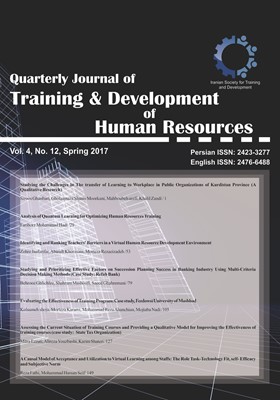Identification of Instructional Competency Evaluation Indicators in Tehran Municipality Managers
Subject Areas :Maryam Hafezy 1 * , fatemeh moradi 2
1 -
2 -
Keywords: Evaluation Indicators, Instructional Competencies, Perceived Competencies, Human Competencies, Technical Competence, Managers.,
Abstract :
The purpose of this research is to identify of Instructional Competency Evaluation Indicators in Tehran Municipality Managers. The method of this research is descriptive as survey type and in terms of purpose it is considered as an applied research. The statistical population are the managers of Tehran municipality. Sample selection was done by random sampling method that included 15 senior managers, 45 middle managers, and 62 executive managers. To collect the research data, we used a questionnaire based on Robert-El-Katz's theory that made by researchers. The questionnaire had 66 questions and was in accordance with Likert scale. Validity of the questionnaire was confirmed by the professors and experts of the field and its reliability coefficient was estimated using Cronbach's alpha (0/964). In order to analyze the collected data, One Sample T-Test and Friedman Test were used. The results of the analysis of data indicate identification of criteria and indicators of each of the instructional competencies of managers as well as the conceptual model of instructional competencies of municipality managers. In addition, the results showed that all indicators of perceived, human and technical competence evaluation at all levels of managers including senior managers, middle and executives are optimal, Except for the perceived competency of mid-level managers who have been moderately evaluated.
رابینز، استیفن. (1384). رفتار سازمانی. ترجمه علی پارساییان و سید محمد اعرابی. جلد دوم، چاپ پنجم. تهران: دفتر پژوهش های فرهنگی.987 صفحه.
علاقهبند، علیرضا. (1373). رهبری اثر بخش از راه ارتباط رویارویی میان مدیر و کارکنان. فصلنامه مدیران در آموزش و پرورش. شماره 11.
علاقهبند،علیرضا. (1388). مدیریت عمومی. چاپ بیستم. تهران: انتشارات روان.
غفوریان، هما. (1387). شاخصهای عملکرد مدیران: نظامهای کنترل و ارزیابی عملکرد. پایگاه مقالات مدیریت. ماهنامه تدبیر، سال چهاردهم، شماره 133.
فردی آذر، علیرضا. (1389). بررسی عوامل سازمانی موثر بر یادگیری سازمانی. سال چهارم. شماره 12.
کامپنهود، لوک وان. (1384). روش تحقیق در علوم اجتماعی. ترجمه عبدالحسین نیک گهر. تهران: نشر توتیا.
گودرزی، محمد. (1382). مقاله طراحی و تبیین الگوی مهارت های سه گانه مدیریتی مدیران سازمان تربیت بدنی جمهوری اسلامی ایران نشریه حرکت.
گیبسون، مارسی. (1376). مهارتهای لازم برای موفقیت در مدیریت. ترجمه امیر رشیدی نیک. تهران: انتشارات مرکز آموزش مدیریت.
ميرسپاسي، ناصر. (1370). لزوم تقويت مهارت مديريت. مجلة مطالعات مديريت بهبود و تحول. دانشكدة حسابداري و مديريت دانشگاه علامه طباطبايي. شمارة 8.
هرسی، پاول و بلانچارد، کن. (1393). مدیریت رفتار سازمانی استفاده از منابع انسانی، ترجمه قاسم کبیری. چاپ پنجم. تهران: انتشارات جهاد دانشگاهی.
El Sabaa, S. (2001). The Skill and Career Path of an Effective Project Manager. Int j Promanage. 19. 1-7.
Gilsing. V., Guysters. (2008). Understanding Novelty Creation in Exploration Networks
Structural and Relational Embeddedness Jointly Considered. Technovation, 28, 693-708.
Katz, R. (1991). Skills of Effective Administrators. Business Classic Fifteen Key Concepts for Managerial Success.
Mintzberg, Henry. (1997). Managing on the Edge, International Journal of Public Sector Management, 10(3), 131-153.
Peterson, T. (2004). The Ongoing Legacy of R.L. Katz. Journal of management Decision, 42(10), 1297-1308.

